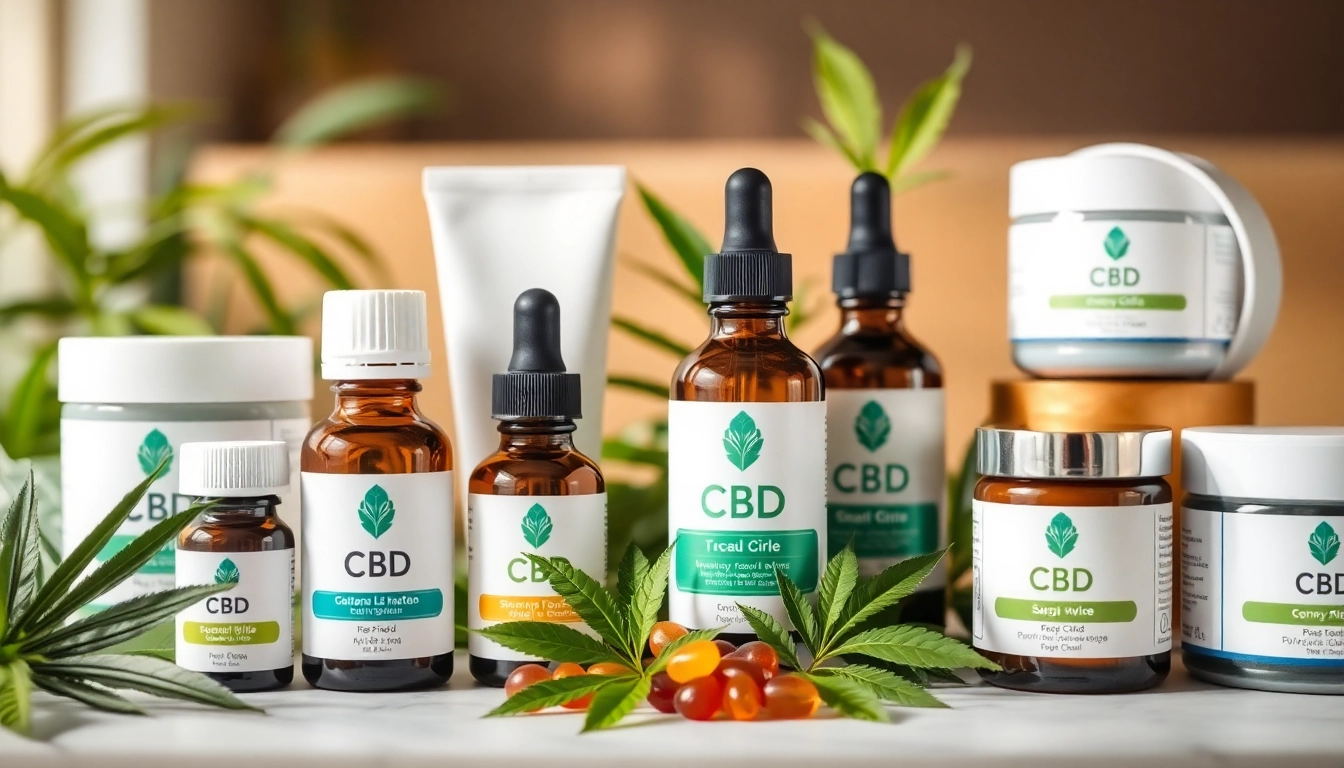Understanding CBD: Types, Uses, and Benefits
What is CBD and How Does It Work in the Body?
Cannabidiol, commonly known as CBD, is a naturally occurring compound found in the Cannabis sativa plant. Unlike THC (tetrahydrocannabinol), CBD does not produce psychoactive effects, making it an attractive option for those seeking potential health benefits without the “high.” Once introduced into the body, CBD interacts with the endocannabinoid system (ECS), a complex network of receptors, enzymes, and endocannabinoids that regulate vital functions such as mood, sleep, immune response, and pain sensation. By modulating ECS activity, CBD may help restore balance and promote overall well-being.
Research indicates that CBD influences various signaling pathways, leading to anti-inflammatory, neuroprotective, and anxiolytic effects. While much remains to be explored, emerging scientific evidence supports the therapeutic potential of CBD across a range of health conditions.
Different Types of CBD Products Available Today
The market is rich with diverse CBD formulations designed to accommodate different preferences and needs. These include:
- CBD Oils and Tinctures: Liquid extracts typically administered via drops under the tongue for quick absorption.
- CBD Edibles: Gummies, capsules, and chocolates offering a discrete and convenient way to consume CBD with longer-lasting effects.
- Topicals: Creams, balms, and lotions infused with CBD, applied directly to the skin for localized relief from pain or skin conditions.
- Vaping Products: CBD vapes and e-liquids providing rapid absorption through inhalation.
- Powders and Beverages: CBD-infused drinks and powders designed for versatility and on-the-go use.
Choosing the right format depends on personal preferences, lifestyle, and specific health goals.
Health Benefits Backed by Scientific Research
While ongoing studies continue to unveil the full potential of CBD, a substantial body of evidence suggests its efficacy in managing a variety of health issues. Notable benefits supported by research include:
- Chronic Pain Relief: CBD interacts with pain signaling pathways, offering a natural alternative for managing conditions like arthritis and neuropathy.
- Reduced Anxiety and Stress: Several studies indicate that CBD can modulate brain regions involved in fear and anxiety, making it useful for social anxiety, PTSD, and generalized anxiety disorder.
- Anti-Inflammatory Effects: CBD’s anti-inflammatory properties may help in conditions characterized by chronic inflammation, such as autoimmune diseases.
- Neuroprotective Uses: Evidence suggests benefits in neurological disorders like epilepsy; in fact, the FDA-approved drug Epidiolex is a CBD-based therapy for certain forms of epilepsy.
- Sleep Improvement: Preliminary data points to CBD assisting with sleep disorders by reducing anxiety and promoting relaxation.
It’s essential for consumers to consult healthcare professionals before starting CBD, especially for managing specific medical conditions.
2. Choosing the Right CBD Products for Your Needs
Factors to Consider When Selecting CBD Oils, Edibles, and Topicals
Given the variety of products on the market, selecting high-quality CBD products requires careful evaluation of several key factors:
- Source and Extraction Method: Opt for products derived from organically grown hemp using CO₂ extraction, which preserves purity and potency.
- Cannabinoid Profile: Verify the THC content to ensure compliance with legal standards—most reputable products are THC-free or contain less than 0.3%.
- Third-Party Testing: Certificates of analysis (COA) from independent labs confirm cannabinoid concentration, safety, and absence of contaminants.
- Bioavailability: Consider delivery methods—tinctures and vapes tend to provide faster effects, while edibles have delayed but longer-lasting impacts.
- Brand Reputation: Research brand transparency, customer reviews, and adherence to regulatory standards.
Dosage Guidelines and Safety Tips for Beginners
Starting with CBD can seem daunting, but small, measured doses are often effective and safe. General guidelines include:
- Begin with a low dose, such as 5-10 mg per day, and gradually increase based on effects and tolerance.
- Maintain consistency in daily intake to assess efficacy over time.
- Monitor for adverse reactions, which are typically mild, including fatigue or gastrointestinal discomfort.
- Consult healthcare providers, especially if on medications or with underlying health conditions, to avoid interactions.
Safety tips also include choosing reputable brands, avoiding unverified claims, and adhering to local regulations.
3. Incorporating CBD into Daily Routines Effectively
Best Practices for Integrating CBD into Wellness Routines
Successful integration involves identifying the right product, timing, and dosage to suit personal lifestyle and health objectives. For example:
- Start mornings with a dose of CBD oil for mood and focus.
- Use topical formulations after exercise to reduce soreness.
- Consume edibles in the evening for relaxation and sleep support.
Tracking your responses—via journals or apps—can help refine your routine for optimal results.
Combining CBD With Other Health and Lifestyle Strategies
CBD is most effective when integrated with holistic health approaches. Consider pairing CBD with practices like:
- Regular physical activity tailored to your capacity.
- Mindfulness, meditation, or yoga for mental clarity and stress reduction.
- Healthy nutrition emphasizing anti-inflammatory foods.
- Consistent sleep hygiene to enhance restorative rest.
Tracking and Measuring Effects for Optimal Results
Establishing a measurement system helps determine what works best for you. Techniques include:
- Maintaining a symptom journal to track changes over time.
- Using wearable devices to monitor sleep patterns and activity levels.
- Regular consultations with healthcare providers for personalized adjustments.
4. Legal Aspects and Regulatory Standards for CBD
Current Legal Status of CBD in Different Regions
Legal frameworks vary widely worldwide and even within countries. In the United States, hemp-derived CBD with less than 0.3% THC is federally legal, but state laws may impose additional restrictions. Similarly, the European Union permits CBD products subject to specific regulations, while other regions have restrictive policies. It is crucial for consumers and vendors to stay informed about local statutes to ensure compliance and avoid legal complications.
Labeling, Testing, and Quality Assurance Measures
Reliable CBD brands adhere to stringent quality standards, providing transparent labels indicating cannabinoid content, ingredients, and batch details. Third-party testing for pesticides, heavy metals, residual solvents, and microbial contaminants is vital to verify product safety. Certification from reputable organizations further assures product integrity.
Understanding Different Certifications and What They Signify
Certifications such as USDA Organic, GMP (Good Manufacturing Practices), and ISO standards indicate adherence to quality protocols. These credentials ensure that products are produced under controlled conditions, free from harmful additives, and meet safety criteria—imperative factors in consumer trust and legal compliance.
5. Future Trends and Innovations in CBD Market
Emerging Formulations and Delivery Methods
Innovations include nanoemulsions for enhanced bioavailability, transdermal patches for sustained release, and novel delivery systems like inhalers. These advancements aim to increase efficacy, convenience, and user experience.
Market Growth and Consumer Demand Insights
The global CBD market continues to expand rapidly, driven by increasing acceptance, regulatory clarity, and growing awareness of health benefits. Consumer demand favors organic, sustainable, and innovative products, prompting brands to invest in research and development.
Potential Health Applications and Research Directions
Future research is exploring CBD’s role in neurodegenerative diseases, metabolic health, and even cancer management. Precision dosing, personalized medicine approaches, and synergistic formulations with other natural compounds are promising areas of development.
As science advances, CBD’s integration into mainstream healthcare could become more refined, offering targeted therapies backed by robust clinical evidence.



